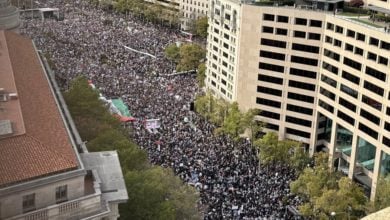Photo: Protester holds copy of the Haitian constitution at a demonstration held in March to oppose Moïse and U.S. intervention in Haiti. Credit — Eugene Puryear
In the early hours of July 7, Haitian president-turned-dictator Jovenel Moïse was assassinated at his home in Port-au-Prince. While many details of the assassination remain unclear, the political vacuum in Haiti will likely result in a fierce struggle over the direction of the nation in the coming weeks.
The Biden administration’s initial reactions to the assassination disturbingly indicate that the U.S. government is considering deepening their intervention in Haiti, which could possibly involve a military intervention. Biden’s official statement pledges that the United States “stand[s] ready to assist”. The spokesman for the State Department ominously said that the United States is “prepared to receive additional requests from Haitian authorities”.
A new U.S. occupation of Haiti, or any type of meddling in the country’s sovereign affairs, would be a disaster. For over a century the U.S. military has helped corporations plunder Haiti, carrying out invasions, supporting coups and menacing anyone who fights for the freedom and independence of the country. Even if they use humanitarian language, the goal of any U.S. intervention remains the same.
The assassination comes at a time of incredible political, social and economic turmoil within Haiti. Increasingly poor living conditions and a grossly inadequate government response to COVID-19 have left the masses of Haitians completely devoid of economic and social support. Already, nearly 60% of the nation lives in extreme poverty, and the failure of the Moïse administration to rectify the root causes of such poverty has exacerbated kidnappings for ransom by people struggling to survive. Repression from the Haitian National Police has only served to make the situation increasingly unsafe and unstable for Haitians.
This, along with a wanton power grab to extend his tenure in office, has prompted mass protests against Moïse. In recent months, the resistance of the Haitian people has led to a historic wave of demonstrations that threatened to unseat his government and opened the possibility that a new force could come to power that is outside the control of U.S. imperialism. It is unclear what effect Moïse’s assassination will have on the popular movement, whose grievances extend far beyond the individual crimes of Moïse.
The assassination also comes just one day after Moïse nominated neurosurgeon Ariel Henry as the new Prime Minister, who, according to the Haitian Constitution, would assume power in Moïse’s place if ever necessary. Henry, a supporter of the 2004 U.S.-backed coup in Haiti which pushed anti-imperialist president Jean Bertrand-Aristide out of Haiti, would be the 6th Prime Minister in the four years of Moïse’s term.
Despite lacking popular support amongst poor and working Haitians, Moïse has ruled by decree since dismissing the Haitian parliament in January 2020, and has refused to step down from the presidency after his term expired on February 7, as stipulated by the Haitian Constitution. Financial and political support for his regime by the U.S. government has been instrumental in maintaining his rule up until this point.
In response to the political vacuum now within Haiti, the threat of U.S. intervention to “stabilize” through occupation looms large. However, it is crucial to understand that the actions of the United States are not done out of concern for the Haitian masses, but for maintaining U.S. power over Haiti.
As the first free Black republic, throughout history Haiti has been subject to assault after assault by the United States and other imperialist governments seeking to curb its potential to achieve a democratic and sovereign nation that prioritizes the needs and well-being of poor and working Haitians. During this critical time for the future of Haiti, it is more important than ever that people in the United States support the demand of the popular Haitian resistance that calls for the end of U.S. and all foreign intervention in the country.





